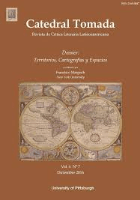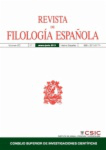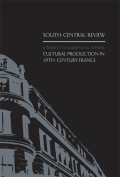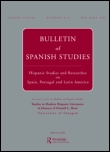
Catedral Tomada-Revista de Critica Literaria Latinoamericana-Journal of Latin American Literary Criticism
Scope & Guideline
Exploring the Depths of Latin American Literary Critique
Introduction
Aims and Scopes
- Interdisciplinary Literary Criticism:
The journal engages in a critical examination of literary texts from various Latin American authors, employing methodologies from literary theory, cultural studies, and social critique. - Focus on Gender and Identity:
A significant theme in the journal is the exploration of gender issues and identity politics in literature, particularly regarding how these themes intersect with historical and cultural contexts. - Historical and Cultural Contextualization:
Papers often contextualize literary works within their historical and cultural frameworks, analyzing how these contexts influence narratives and critical reception. - Emerging Voices and Regional Literature:
The journal highlights lesser-known authors and regional literatures, providing a platform for diverse voices that challenge mainstream literary narratives. - Analysis of Literary Institutions:
An important scope includes the study of literary institutions and their roles in shaping literary production and critique across Latin America.
Trending and Emerging
- COVID-19 and Literature:
Recent publications highlight the impact of the COVID-19 pandemic on literary production and reception, examining how authors adapt narratives to reflect crises in society. - Ecocriticism and Environmental Themes:
Emerging discussions around ecological concerns and climate change in literature indicate a growing trend towards ecocriticism, particularly in the context of Latin American narratives. - Intersectionality in Literary Critique:
There is an increasing focus on intersectional approaches that analyze how various identities—such as race, gender, and class—interact within literary texts, showcasing the complexity of social issues. - Digital Humanities and Literature:
The journal is beginning to explore the implications of digital culture on literary studies, including how digital platforms affect narrative forms and literary criticism. - Speculative Fiction and Social Commentary:
A rise in analyses of speculative fiction reflects a trend towards exploring how this genre serves as a means of critiquing contemporary social issues, such as political unrest and environmental crises.
Declining or Waning
- Traditional Canonical Criticism:
There appears to be a waning interest in traditional literary canon studies, as the journal increasingly seeks to amplify marginalized voices and contemporary issues rather than rehash established canonical texts. - Purely Theoretical Approaches:
There is a noticeable decline in articles that focus solely on theoretical frameworks without practical application to specific texts or cultural phenomena, suggesting a shift towards more applied criticism. - Historical Narratives in Isolation:
The examination of historical narratives without connecting them to contemporary issues or current literary practices has become less frequent, indicating a preference for analyses that bridge past and present. - Formalism and Textual Analysis:
There seems to be a diminishing emphasis on formalist approaches that prioritize textual analysis over socio-political contexts, as the journal prioritizes readings that engage with broader cultural implications.
Similar Journals

REVISTA DE FILOLOGIA ESPANOLA
Advancing Scholarship in Spanish Philology Since 1954REVISTA DE FILOLOGIA ESPANOLA is a distinguished academic journal dedicated to the fields of linguistics and literature, published by the CONSEJO SUPERIOR INVESTIGACIONES CIENTIFICAS (CSIC) since 1954, and has been an Open Access journal since its inception. Situated in Madrid, Spain, this journal has emerged as a crucial platform for the dissemination of scholarly research, with notable rankings including Q2 in Linguistics and Language and Q1 in Literature and Literary Theory as of 2023. The journal's commitment to fostering academic dialogue is reflected in its impressive Scopus rankings, including a 79th percentile in the Arts and Humanities for Literature and Literary Theory. Covering a wide range of topics from linguistic theory to literary critique, REVISTA DE FILOLOGIA ESPANOLA is essential reading for researchers, professionals, and students alike, providing valuable insights and cutting-edge research in the ever-evolving landscape of Spanish philology.

REVISTA CHILENA DE LITERATURA
Advancing literary scholarship and dialogue.REVISTA CHILENA DE LITERATURA, published by Universidad de Chile, Facultad de Filosofía y Humanidades, is a premier open-access journal that has been at the forefront of literary scholarship since its inception in 2004. With its ISSN 0718-2295, the journal focuses on a wide array of topics within the field of literature and literary theory, striving to foster intellectual discourse and innovation. It has gained notable recognition, reflected in its Q2 category ranking in 2023, positioning it among the top journals in its field within the Scopus database, where it ranks #513 out of 1106 journals, placing it in the 53rd percentile. Hailing from Chile, the journal also serves as a vital platform for researchers and students to disseminate their work, enhancing the global dialogue in literature. With a history of convergence from 2007 to 2023, REVISTA CHILENA DE LITERATURA is committed to advancing literary research and its implications in contemporary contexts, making it an essential resource for anyone engaged in literary studies.

South Central Review
Connecting Ideas that Shape Southern Cultural IdentitySouth Central Review, a distinguished academic journal published by Johns Hopkins University Press, serves as a vital platform for scholarly discourse in the fields of cultural studies, literature and literary theory, philosophy, and the visual and performing arts. With an ISSN of 0743-6831 and an E-ISSN of 1549-3377, this journal is dedicated to highlighting innovative research and critical analyses that explore the complexities of Southern culture and its broader implications. Although it operates without an open access option, the journal is recognized for its rigorous peer-review process and contributions to contemporary academic dialogue, holding Q3 and Q4 rankings across several disciplines as of 2023. The convergence of ideas and perspectives from diverse academic backgrounds positions the South Central Review as an essential resource for researchers, professionals, and students seeking to deepen their understanding of the cultural narratives shaping our world today.

AMERICAN LITERARY REALISM
Celebrating the Legacy of American Literary RealismAMERICAN LITERARY REALISM is a distinguished journal published by University of Illinois Press, focusing on the field of American literature and narrative realism from the 19th and 20th centuries. With an ISSN of 0002-9823 and an E-ISSN of 2326-9235, this journal serves as a vital platform for scholarly discourse, fostering critical analysis and innovative scholarship in literary studies. Although it operates under a traditional subscription model, the journal’s contributions are invaluable in promoting a deeper understanding of realist literature’s complexities, cultural contexts, and impact on contemporary narratives. With a commitment to upholding high academic standards, AMERICAN LITERARY REALISM is instrumental for researchers, students, and professionals looking to explore the rich tapestry of realism in American literary tradition, making it an essential resource in the humanities.

Valenciana
Fostering collaboration and creativity in academic discourse.Valenciana is an esteemed, peer-reviewed journal published by the University of Guanajuato, dedicated to advancing scholarly discourse in the fields of humanities and social sciences. Since its inception in 2008, this Open Access journal has facilitated unrestricted access to high-quality research, fostering collaboration and innovation among researchers, professionals, and students. With an ISSN of 2007-2538 and an E-ISSN of 2448-7295, Valenciana is committed to publishing original research, reviews, and theoretical contributions that illuminate contemporary issues and cultural phenomena. The journal not only serves as a platform for emerging voices in academia but also enhances its visibility in the global research landscape, driving interdisciplinary dialogue and engagement. Situated in Guanajuato, Mexico, Valenciana embraces the rich academic heritage of the region while also appealing to a broader audience, making it a vital resource for those seeking to explore new ideas and perspectives in their respective fields.

MISSISSIPPI QUARTERLY
Navigating Interdisciplinary Landscapes in Literary StudiesMISSISSIPPI QUARTERLY, published by Johns Hopkins University Press, is a distinguished journal that delves into the realms of Cultural Studies and Literature and Literary Theory. Since its inception, the journal has served as a vital platform for scholarly exchange and critical analysis, making significant contributions to understanding literary and cultural phenomena through varied interdisciplinary approaches. With an ISSN of 0026-637X and an e-ISSN of 2689-517X, it operates without Open Access, ensuring a selective dissemination of high-quality research. Despite being positioned in the Q4 quartile based on the 2023 ranking, it maintains a unique appeal for researchers, professionals, and students seeking to navigate the complexities of culture and literature. The journal has converged its publishing years to remain relevant amid evolving academic discourses, ensuring that it continues to address contemporary challenges and themes in literature. As an important academic resource, MISSISSIPPI QUARTERLY promises to stimulate discussion and provoke thought, inviting new voices to contribute to the ongoing dialogue in these critical fields.

NEOPHILOLOGUS
Fostering Scholarly Dialogue in Language and Literary StudiesNEOPHILOLOGUS, published by Springer, stands as a pivotal journal in the fields of Linguistics and Language as well as Literature and Literary Theory. With an illustrious history dating back to 1916 and continuing through various phases until 2024, this journal has entrenched itself as a crucial platform for scholarly discussion and research dissemination. NEOPHILOLOGUS is recognized for its high academic standards, as evidenced by its impressive category quartiles, ranking in the Q2 tier for Linguistics and Language and Q1 for Literature and Literary Theory as of 2023. Notably, it ranks in the 81st percentile for Arts and Humanities in the Scopus database, underscoring its significant contribution to the humanities discourse. While the journal does not currently offer open access options, it remains a valuable resource for researchers, professionals, and students seeking in-depth analyses and insights within its specialized domains. Based in Dordrecht, Netherlands, NEOPHILOLOGUS invites contributions that advance our understanding of linguistic and literary phenomena, ensuring its relevance and impact in these dynamic fields.

Cuadernos Lirico
Fostering Innovative Perspectives in Literary StudiesCuadernos Lirico is a prestigious academic journal dedicated to the exploration of literature and literary theory, published by CUADERNOS LIRICO. With an ISSN of 2263-2158 and E-ISSN 2262-8339, this journal has been committed to open access since 2011, ensuring wide dissemination of its research across the globe. Based in France, the journal serves as a vital platform for scholars and practitioners, promoting innovative discourse within its field. Despite its current position in Q4 of the Literature and Literary Theory category and a Scopus rank of #993/1106, Cuadernos Lirico aims to bolster its impact through the publication of high-quality, peer-reviewed articles that contribute to the understanding and analysis of literary texts and theories. The journal invites contributions that engage with diverse perspectives and methodologies, fostering a rich dialogue among researchers, literary critics, and educators. Join us in advancing the scholarly pursuit of literature by contributing to this dynamic platform.

CRITICA LETTERARIA
Navigating the Complexities of Literature and TheoryCRITICA LETTERARIA is an esteemed literary journal published by Paolo Loffredo Iniziative Editoriali SRL that has been contributing to discussions in the field of literature and literary theory since its inception in 2009. With an ISSN of 0390-0142 and an E-ISSN of 2035-2638, this journal is indexed in Scopus, ranking in the category of Arts and Humanities under Literature and Literary Theory. It is classified in the Q4 quartile, indicating its dedication to serving a niche yet vital discourse within the broader literary community. Although currently not open access, the journal offers a platform for scholars, researchers, and students to engage with diverse literary analyses and theoretical advancements. Located in the vibrant city of Naples, Italy, CRITICA LETTERARIA aims to foster academic dialogue and promote innovative approaches in literary studies, making it an important resource for anyone passionate about navigating the complexities of literary narratives and theory.

Bulletin of Spanish Studies
Advancing Scholarly Discourse in Spanish StudiesBulletin of Spanish Studies is a prominent academic journal dedicated to the exploration and discourse of Spanish studies within the diverse realms of Cultural Studies and Literature and Literary Theory. Published by Routledge Journals, Taylor & Francis Ltd, this journal serves as a crucial platform for scholars, researchers, and students to disseminate their findings and engage in scholarly debates related to Spanish literature, culture, and linguistics. With an emphasis on high-quality, peer-reviewed research, the journal holds a reputable Q3 ranking in Cultural Studies and a commendable Q2 ranking in Literature and Literary Theory, reflecting its significant impact within the academic community. The Bulletin is indexed in notable databases, achieving a rank of #314 out of 1106 in Literature and Literary Theory and #738 out of 1304 in Cultural Studies, signaling its vital role in advancing knowledge in these fields. Although it does not currently offer open access options, the journal remains an essential resource for those passionate about the study of Spanish culture and literature from 2010 to 2024 and beyond.